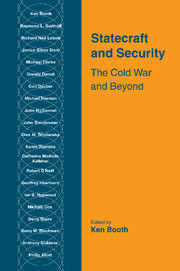Book contents
- Frontmatter
- Contents
- List of contributors
- Preface
- Introduction
- Part one Cold War: lessons and legacies
- Part two Post-Cold War: powers and policies
- 5 Can the United States lead the world?
- 6 Can Russia escape its past?
- 7 Imperialism, dependency and autocolonialism in the Eurasian space
- 8 Western Europe: challenges of the post-Cold War era
- 9 Europe and the wider world: the security challenge
- 10 A new Japan? A new history?
- 11 New China: new Cold War?
- 12 Africa: crisis and challenge
- 13 Of medium powers and middling roles
- Part three Beyond: resistances and reinventions
- Conclusion: security within global transformation?
- Index
8 - Western Europe: challenges of the post-Cold War era
Published online by Cambridge University Press: 06 October 2009
- Frontmatter
- Contents
- List of contributors
- Preface
- Introduction
- Part one Cold War: lessons and legacies
- Part two Post-Cold War: powers and policies
- 5 Can the United States lead the world?
- 6 Can Russia escape its past?
- 7 Imperialism, dependency and autocolonialism in the Eurasian space
- 8 Western Europe: challenges of the post-Cold War era
- 9 Europe and the wider world: the security challenge
- 10 A new Japan? A new history?
- 11 New China: new Cold War?
- 12 Africa: crisis and challenge
- 13 Of medium powers and middling roles
- Part three Beyond: resistances and reinventions
- Conclusion: security within global transformation?
- Index
Summary
What does the future hold for Western Europe? The fall of the Berlin Wall bred contending theories of Western Europe's fate in the absence of the Cold War framework of superpower protection. On one side were the neo-realists, projecting a bleak future which would see the re-emergence of traditional power politics and old rivalries. On the other side, integrationists were predicting an explosion of cooperation and an extension of Western European security and prosperity eastward. The only point of agreement was that there would be serious hurdles to overcome in the post-Cold War world.
This chapter will begin by examining the neo-realist argument, with an eye towards explaining why it is overall too pessimistic in its predictions. It will then examine the challenges facing Western Europe, and the European Union (EU) in particular, and explain what must be done if the future for Western Europe is to be brighter than the neo-realists would have it.
The neo-realist vision of Europe
The end of the Cold War was followed almost immediately by a strong sense of nostalgia, a longing for a period in which everyone had grown comfortable in their given international roles – where inter-European squabbles were sublimated to the struggle between the superpowers, the result being an unprecedented period of stability in Western Europe. This romanticism was most prevalent in neo-realist thought, and was exemplified by the writings of scholars such as John Mearsheimer (1990) and Owen Harries (1993).
- Type
- Chapter
- Information
- Statecraft and SecurityThe Cold War and Beyond, pp. 179 - 193Publisher: Cambridge University PressPrint publication year: 1998



